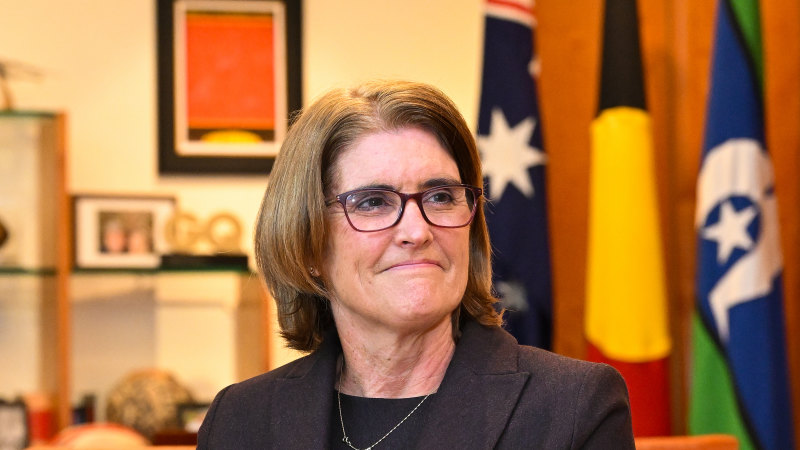Save articles for later
Add articles to your saved list and come back to them any time.
Key posts
- Minister defends proposed misinformation laws
- Pacific region more contested, less secure: NZ Prime Minister
- This morning’s headlines at a glance
1 of 1
Voice to parliament pamphlets to be submitted
The Yes campaign for the Indigenous voice to parliament will hand in its case for the referendum pamphlet after collaborating across parliament.
Supporters of the Voice will submit their case to the Australian Electoral Commission on today.
Politicians from all sides were consulted to have input for the Yes case.
Crossbenchers who voted to back the voice legislation were offered briefings, led by Indigenous Australians Minister Linda Burney and Attorney-General Mark Dreyfus.
Minister for Indigenous Australians Linda Burney.Credit: Alex Ellinghausen
Ms Burney described the process as “collaborative” and said it had brought together the best arguments in support of the voice.
“A Voice is an idea many years in the making and many Indigenous Australians have put a great deal of hard work into achieving constitutional recognition,” she said.
“I encourage Australians to join this national conversation about constitutional recognition through a Voice and consider how we can make practical change that will improve lives.”
Cabinet minister Madeline King joined Greens Indigenous spokeswoman Dorinda Cox, independent MP Kate Chaney and Yes campaigners in Perth on Sunday ahead of the submission for the pamphlet.
Deputy Liberal Leader Sussan Ley said she hoped both cases would clearly outline their arguments, so voters could make informed decisions.
“Ordinary Australians will take this seriously, and they will listen closely to the messages that come,” she told reporters.
The Yes and No cases for the Voice will be published on the Electoral Commission’s website tomorrow.
AAP
Minister defends proposed misinformation laws
Communications Minister Michelle Rowland has warned the Coalition not to “go soft” on big tech as it prepares to fight the government’s proposed misinformation laws, insisting that a beefed-up media regulator would have no role in determining the truth of online content.
Concern is mounting within the federal opposition about the potential effect on free speech that could flow from Labor’s proposal to give the Australian Communications and Media Authority (ACMA) new powers to crack down on digital platforms that fail to combat misinformation and disinformation.
Communications Minister Michelle Rowland has warned the Coalition not to go soft on big tech as she defended the government’s proposed misinformation laws.Credit: Alex Ellinghausen
In an interview addressing criticisms levelled at the proposal, Rowland rejected the claims by some Coalition MPs that the laws would make ACMA an Orwellian “Ministry of Truth”, saying “there is nothing in the proposed legislation that goes to any of those issues”.
She said the laws were designed to give ACMA powers to hold platforms to account, but the regulator would have “no interest and no power [over] what individual users may be posting”.
Find out more on the proposed law here.
Pacific region more contested, less secure: NZ Prime Minister
New Zealand Prime Minister Chris Hipkins said the Pacific region is becoming more contested, less predictable, and less secure as China becomes more assertive.
“China’s rise and how it seeks to exert that influence is also a major driver of the increasing strategic competition, particularly in our wider home region, the Indo-Pacific,” Hipkins said in a speech to the China Business Summit.
Hipkins added that it is important that we continue to engage with China – to listen and to build dialogue, to pursue New Zealand’s interests, and to add a voice where it matters.
Prime Minister of New Zealand Chris Hipkins.Credit: AP
Wellington has historically taken a more conciliatory approach towards China than Australia or its other Five Eyes security partners, Canada, the United States and the United Kingdom.
But in recent years, New Zealand has become increasingly vocal on issues including human rights, the international rules-based order and potential militarisation of the Pacific.
Hipkins said a small country like New Zealand cannot work alone, and the government recognises the importance of building partnerships and inclusivity to address global challenges.
That New Zealand’s approach will often align with that of our most like-minded partners, with whom we share many common interests and values, should not be a surprise, he added.
“Common interests and concerns do not mean we will always take the same approach. Sometimes there is tactical strength in a diversity of approaches to achieve the same outcomes,” he said.
Reuters
This morning’s headlines at a glance
Good morning, and thanks for your company.
It’s Monday, July 17. I’m Caroline Schelle, and I’ll be anchoring our live coverage for the first half of the day.
Here’s what you need to know before we get started:
- Communications Minister Michelle Rowland has warned the Coalition not to “go soft” on big tech as it prepares to fight the government’s proposed misinformation laws.
- Ausnet is confident an expansion of the transmission network can be delivered to connect enough wind and solar farms to compensate for coal-fired plant closures.
- The treasurer defended remarks by the incoming Reserve Bank of Australia governor that more workers will have to lose their jobs before the economy becomes more “sustainable”.
- Top scientists who backed the creation of the federal government’s $20 billion Medical Research Future Fund are now leading calls for a dramatic overhaul of the program.
Prime Minister Anthony Albanese and Treasurer Jim Chalmers announce the new RBA governor.Credit: AAP
- Labour markets in NSW and Victoria are among the first to show signs of being reshaped by artificial intelligence.
- In Victoria, gamblers will be forced to set binding limits on daily poker machine losses under strict new pokies rules.
- All remaining COVID-19-related fines in NSW, worth tens of millions of dollars, could be cancelled following a fresh court challenge.
- And overseas, New Zealand Prime Minister Chris Hipkins said the Pacific region is becoming more contested and less secure as China becomes more assertive.
- And fighters from the Wagner group arrived in Belarus from Russia, according to Ukrainian and Polish officials.
1 of 1
Most Viewed in National
Source: Read Full Article





